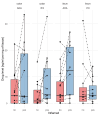Intestinal tissue levels of anti-TNF alpha, antibodies, and cytokines in paediatric Crohn disease
- PMID: 39775097
- PMCID: PMC11707019
- DOI: 10.1038/s41598-024-83858-7
Intestinal tissue levels of anti-TNF alpha, antibodies, and cytokines in paediatric Crohn disease
Abstract
The aim was to explore factors associated with intestinal tissue levels of anti-TNF alpha (anti-TNF), anti-TNF antibodies, and cytokines in pediatric patients with Crohn Disease (CD). In a prospective exploratory study of CD patients undergoing ileocecal resection or colonoscopy between 6/2020 and 1/2023, we analysed tissue levels of anti-TNF, anti-TNF antibodies, and cytokines (TNF-α, IL-17, IL-1β, IFN-γ) from intestinal biopsies. Mixed-effects regression models, adjusted for potential confounders, were used. Data from 27 CD patients (18 females, 66.7%) were analysed. Fourteen (52%) received adalimumab (ADA) and thirteen received infliximab (IFX), with a median therapy duration of 17 (IQR 4.5-41.5) months. Higher levels of free anti-TNF were found in macroscopically inflamed tissue compared to non-inflamed tissue (β = 3.42, 95% CI 1.05-6.10). No significant association was found between serum and tissue anti-TNF levels (β= -0.06, 95% CI - 0.70-0.58). Patients treated longer with anti-TNF had increased IL-17 levels (β = 0.19, 95% CI 0.05-0.33), independent of disease duration and age. IFN-γ levels were linked with both follow-up duration and anti-TNF length. Our study shows significantly higher free drug levels in inflamed tissue. Long-term anti-TNF treatment has been linked to increased IL-17 levels, suggesting a possible impact on the cytokine response pathway. We did not observe a relationship between serum and tissue anti-TNF levels.
Keywords: Biologics; Crohn disease; Inflammatory bowel disease; Paediatrics.
© 2025. The Author(s).
Conflict of interest statement
Declarations. Competing interests: The authors declare no competing interests.
Figures

Similar articles
-
Circulating Cytokines and Cytokine Receptors in Infliximab Treatment Failure Due to TNF-α Independent Crohn Disease.Medicine (Baltimore). 2016 Apr;95(16):e3417. doi: 10.1097/MD.0000000000003417. Medicine (Baltimore). 2016. PMID: 27100432 Free PMC article. Clinical Trial.
-
Tissue Drug Concentrations of Anti-tumor Necrosis Factor Agents Are Associated with the Long-term Outcome of Patients with Crohn's Disease.Inflamm Bowel Dis. 2017 Dec;23(12):2172-2179. doi: 10.1097/MIB.0000000000001260. Inflamm Bowel Dis. 2017. PMID: 28945638
-
Correlations between skin lesions induced by anti-tumor necrosis factor-α and selected cytokines in Crohn's disease patients.World J Gastroenterol. 2014 Jun 14;20(22):7019-26. doi: 10.3748/wjg.v20.i22.7019. World J Gastroenterol. 2014. PMID: 24944497 Free PMC article.
-
Maintenance-phase serum anti-TNF levels are not associated with mucosal healing in pediatric Crohn's disease.J Pediatr Gastroenterol Nutr. 2025 Apr;80(4):644-652. doi: 10.1002/jpn3.12471. Epub 2025 Jan 28. J Pediatr Gastroenterol Nutr. 2025. PMID: 39871722
-
A Review on the Use of Anti-TNF in Children and Adolescents with Inflammatory Bowel Disease.Int J Mol Sci. 2019 May 23;20(10):2529. doi: 10.3390/ijms20102529. Int J Mol Sci. 2019. PMID: 31126015 Free PMC article. Review.
Cited by
-
Prevalence of metabolic syndrome in patients with inflammatory bowel disease: a meta-analysis on a global scale.J Health Popul Nutr. 2025 Apr 9;44(1):112. doi: 10.1186/s41043-025-00860-z. J Health Popul Nutr. 2025. PMID: 40205601 Free PMC article.
-
A Characterization of the Humoral Immune Response to Human Endogenous Retroviruses and Mycobacterium paratuberculosis in Crohn's Disease.Pathogens. 2025 Apr 7;14(4):361. doi: 10.3390/pathogens14040361. Pathogens. 2025. PMID: 40333136 Free PMC article.
References
-
- Kuenzig, M. E. et al. Twenty-first century trends in the global epidemiology of pediatric-onset inflammatory bowel disease: Systematic review. Gastroenterology162(4), 1147-1159.e4. 10.1053/j.gastro.2021.12.282 (2022). - PubMed
-
- Ordás, I., Mould, D. R., Feagan, B. G. & Sandborn, W. J. Anti-TNF monoclonal antibodies in inflammatory bowel disease: Pharmacokinetics-based dosing paradigms. Clin. Pharmacol. Ther.91(4), 635–646. 10.1038/clpt.2011.328 (2012). - PubMed
Publication types
MeSH terms
Substances
Supplementary concepts
Grants and funding
LinkOut - more resources
Full Text Sources
Medical
Research Materials

